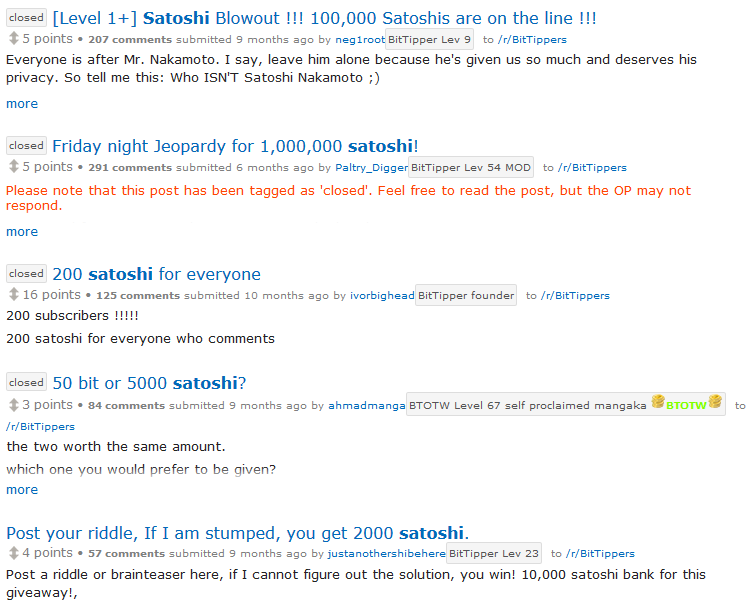Satoshi (unit): Difference between revisions
spelling corrected |
m update satoshi reference price in euro |
||
| Line 5: | Line 5: | ||
Although the satoshi is the finest amount that can be recorded in the blockchain,<ref name="why"/> [[payment channels]] may need to make very granular payments and so are sometimes denominated in ''millisatoshi'', which are one hundred billionths of a single bitcoin.<ref>[https://github.com/ElementsProject/lightning/blob/master/README.md#receiving-and-receiving-payments Receiving and receiving payments]</ref> | Although the satoshi is the finest amount that can be recorded in the blockchain,<ref name="why"/> [[payment channels]] may need to make very granular payments and so are sometimes denominated in ''millisatoshi'', which are one hundred billionths of a single bitcoin.<ref>[https://github.com/ElementsProject/lightning/blob/master/README.md#receiving-and-receiving-payments Receiving and receiving payments]</ref> | ||
In | In March 2024, 1 Euro cent is worth approximately 16 satoshi. | ||
==History== | ==History== | ||
Latest revision as of 15:37, 21 March 2024

The satoshi is currently the smallest unit of the bitcoin currency recorded on the block chain.[1] It is a one hundred millionth of a single bitcoin (0.00000001 BTC).[1] The unit has been named in collective homage to the original creator of Bitcoin, Satoshi Nakamoto.[2]
All amounts in the blockchain are denominated in satoshi before being converted for display.[3] The source code also uses satoshi when specifying an amount of bitcoin.[4] When displaying an extremely fine fraction of a bitcoin, such as when calculating fee per byte or a faucet reward, the amount is displayed in satoshi for readability.[5][6]
Although the satoshi is the finest amount that can be recorded in the blockchain,[3] payment channels may need to make very granular payments and so are sometimes denominated in millisatoshi, which are one hundred billionths of a single bitcoin.[7]
In March 2024, 1 Euro cent is worth approximately 16 satoshi.
History
The value of a bitcoin in satoshi was decided by Satoshi Nakamoto to be 100 million no later than November 2008.[4]
On November 15, 2010, ribuck proposed that the one hundredth of a bitcoin (0.01 BTC) be called a Satoshi.[8] Four months later he instead suggested that the one hundred millionth unit be called an austrian or a satoshi.[9] The name satoshi caught on, and was widely adopted thereafter.[2]
In December 2017, BIP-176[10] also proposed "Bits" be used as a standard term for 100 (one hundred) satoshis or 1/1,000,000 (one one-millionth) of a bitcoin.
Usage
Plural
Traditionally, the plural form has been simply satoshi,[11] but the term satoshis is also popular and equally correct. If the plural form were to follow the rules of Japanese grammar, it may be pronounced as satoshisa,[12] or simply satoshi.[12]
Symbol
Satoshi is often abbreviated to sat or s, although no currency symbol has been widely adopted. There are various proposed symbols:
References
- ↑ 1.0 1.1 What is a 'Satoshi'? - Bitcoin Stack Exchange
- ↑ 2.0 2.1 BitcoinTalk thread 407442. How did “satoshi” become the name of the base unit? 9 January 2014. Post 4415850.
- ↑ 3.0 3.1 BitcoinTalk thread 819656. Why 1BTC should equal 10^8 satoshi ? 11 October 2014.
- ↑ 4.0 4.1 BitcoinTalk thread 382374. Bitcoin source from November 2008. 23 December 2013.
- ↑ Binns, Will. "How do I calculate my transaction fee?". 21 Support. https://support.21.co/bitcoin/transactions-and-fees/how-do-i-calculate-my-transaction-fee. Retrieved 23 October 2017.
- ↑ Barnes, Samuel (9 April 2014). "Do These "Free Bitcoin" Sites Work?". CryptoCoinsNews. https://www.cryptocoinsnews.com/do-free-bitcoin-sites-work/. Retrieved 19 August 2015.
- ↑ Receiving and receiving payments
- ↑ BitcoinTalk thread 369. Official Bitcoin Unicode Character? 14 July 2010. Post 22160.
- ↑ BitcoinTalk thread 3311. More divisibility required - move the decimal point 10 February 2011. Post 46648.
- ↑ https://github.com/bitcoin/bips/blob/master/bip-0176.mediawiki
- ↑ Bitcoin Wiki revision by theymos
- ↑ 12.0 12.1 BitcoinTalk thread 289475. satoshii 9 September 2013. Post 3112861.
